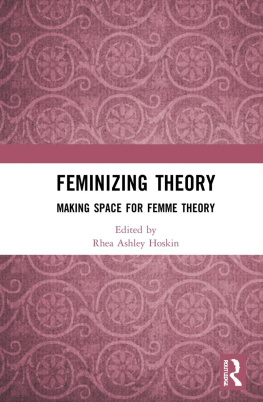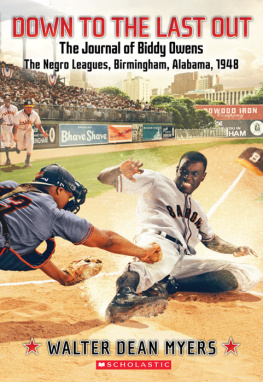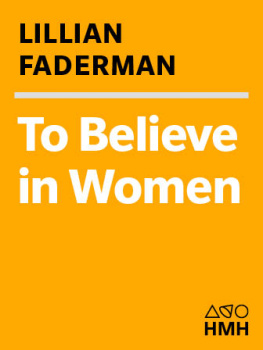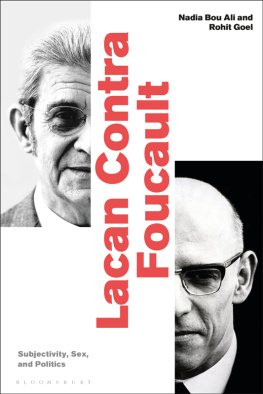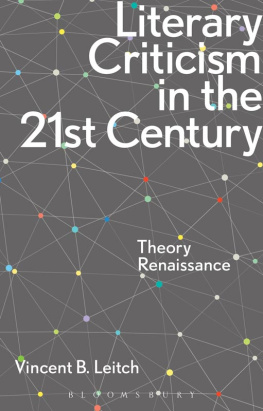Published in 1996 by
Routledge
29 West 35th Street
New York, NY 10001
Published in
Great Britain by
Routledge
11 New Fetter Lane
London EC4P 4EE
Copyright 1996 by
Routledge
Printed in the United
States of America on acid
free paper.
All rights reserved. No part of this book may be reprinted or reproduced or utilized in any form or by any electronic, mechanical or other means, now known or hereafter invented, including photocopying and recording, or in any information storage or retrieval system, without permission in writing from the publisher.
Library of Congress Cataloging-in-Publication Data
Martin Biddy, 1951
Femininity played straight: gender, sexuality, subjectivity/
Biddy Martin.
p. cm.
Includes bibliographical references (p.) and index.
ISBN 0-415-91680-1. ISBN 0-415-91681-X (pbk.)
1. Feminist theory.
2. Lesbianism.
3. Gender identity.
4. Foucault, MichelContibutions in feminist theory.
I. Tide.
HQ1206.M3446 1996 96-892
305.4201dc20 CIP
ACKNOWLEDGMENTS
I WANT to thank Bill Germano for his support and patience, particularly when tragedies delayed the completion of this book. My deepest appreciation goes to Carol Maxwell Miller for her immediate grasp of the conceptual, political, and personal stakes in each essay, her insistence that I push my thinking beyond some of its impasses, and her marvelous feel for language. A number of friends and colleagues have contributed to this work, foremost among them, my friends close to home: Isabel Hull, who, in addition to her longstanding friendship and intellectual companionship, also helped me revise the introduction to this book, and David Bathrick, whose direct and indirect contributions exceed any specific acknowledgment. Judith Butler's thinking has engaged me for many years, as these essays show, and I greatly value her friendship and her commentary on my work. I also want to thank Nancy Bereano and Julie D'Acci for our many discussions of writing and politics over years of friendship.
My most important interlocutors have been my graduate students at Cornell. For the most sustained discussions of feminist and queer theory I thank Lisa Moore, Paisley Currah, Trevor Hope, Rich Weldgen, Chris Nealon, Christian Gundermann, Jeff Schneider, and Barbara Mennel, all of whom have been active in creating an intellectual community in which lesbian and gay studies has a crucial place.
Special thanks to Gisela Podleski and to Jeff Schneider for their help with the final preparation of the manuscript. Jeff Schneider's superb editorial skills have been invaluable once again.
Finally, I wish to thank Boolie, Eddie, Fonda, Debi, Sid, Scott, and Katelyn Martin for the bonds we have sustained. I thank Louise Miller for her support and interest in my work. Gabi Strauch and Timi Mayer are also family, and Carol is at the core. Carter Martin's importance in my life and work remains incalculable.
Most of the essays in this book have been published previously.
Feminist Metaphysics first appeared in the Working Paper Series, University of Wisconsin-Madison Women's Studies Research Center, no. 4,1981.
Feminism, Criticism, and Foucault is reprinted by permission from New German Critique: An Interdisciplinary Journal of German Studies 27. Copyright 1982.
Feminist Politics: What's Home Got to Do With It first appeared in Feminist Studies/Critical Studies, ed. Teresa de Lauretis. Copyright 1986. Reprinted by permission of Indiana University Press.
Lesbian Identity and Autobiographical Differences was first published in Life/Lines: Theorizing Women's Autobiography, ed. Bella Brodzki and Celeste Schenck. Copyright 1988 by Cornell University. Used by permission of the publisher, Cornell University Press.
Sexual Practice and Changing Lesbian Identities first appeared in Destabilizing Theory ed. Michele Barrett and Ann Rosalind Jones. Copyright 1986. Reprinted by permission of Blackwell Publishers.
Sexualities Without Genders and other Queer Utopias first appeared in Diacritics Special Double Issue Critical Crossings, ed. Judith Butler and Biddy Martin. Copyright 1994. Reprinted by permission of the Johns Hopkins University Press.
The Hobo, the Fairy and the Quarterback was originally published in Profession 94, and is reprinted with permission of the Modern Language Association.
Extraordinary Homosexuals and the Fear of Being Ordinary is reprinted by permission from Differences: A Journal of Feminist Cultural Studies. It appeared in the Special Double Issue More Gender Trouble. Copyright 1994.
INTRODUCTION
[1995]
In Memory of Carter Dewitt Martin 19541995
THE ESSAYS that follow were written over a seventeen-year period extending from 1978, when I was in my second year of graduate study in German at the University of Wisconsin, to 1995, when I was in my second year as chair of German Studies at Cornell. The essays begin with a critique of Marxist and radical feminist thought and then move to Fou-cault, whose work seemed to promise another intellectual and political path in 1980.only normative but virtually compulsory I have also written against efforts to counter homophobic abjections and demonizations of homosexuality with claims to the extraordinary difference that homosexuality or queerness makes. All the essays resist a politics of rebellion and an abstract theory of anti-normativity because of their tendencies to simplify problems and to defend against social investments. To use figures currently in vogue, I prefer to think in terms of the pleats and folds of subjectivity and sociality, rather than radical oppositions or syntheses of discrete domains. The appeal of such conceptual terms comes, in part, from my belief in the importance of something as simple and basic as attachment, investment, even love. I take a certain amount of aesthetic and intellectual pleasure in theoretical and literary provocations that imagine anti- or a-sociality radical forms of detachment, and intensified relations to the death drive to be the most viable of all possible strategies or universes. But the relations between attachment and detachment, between investments in life and recognitions of death and deathliness, and between anti-normativity and societalization can never be thought in a way that would leave me comfortably on one side or the other. This introduction traces some of the intersections between my intellectual and emotional attachments and then ends by reiterating my hesitations about theories that elevate radical detachment, anti-societalization, and transgression to the level of a reactive sublime.
*
I could use happenstance, opportunity, partially realized intentions, and necessity to generate at least two equally reductionist narratives about my way through developments in feminist and cultural theory in the United States over the past seventeen years. The first narrative would begin with Simone de Beauvoir, move in the direction of Marxist and Marxist-feminist debates, through radical feminist challenges to liberal- and left-feminisms, and then mark the shift to what was once known as French theory as a positive step forward out of simplistic theories of representation, out of the dogmas of radical and lesbian feminist writing, and out of Marxists' refusals or inability to think about sexuality in ways that did justice to its structural significance. The alternative narrative would lament the first trajectory and expose the exclusions that (French) theory required of what has come to be defined as properly feminist and queer theory. In the end, I hold to no one theory or theoretical tradition but imagine that thinking about the complexity of social and psychological lives requires the integration of a range of critical approaches.


